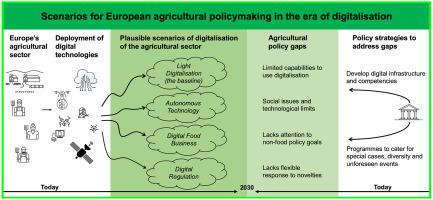Agricultural Systems ( IF 6.6 ) Pub Date : 2021-11-26 , DOI: 10.1016/j.agsy.2021.103318 Melf-Hinrich Ehlers 1, 2 , Robert Finger 1 , Nadja El Benni 2 , Alexander Gocht 3 , Claus Aage Grøn Sørensen 4 , Markus Gusset 5 , Catherine Pfeifer 6 , Krijn Poppe 7 , Áine Regan 8 , David Christian Rose 9 , Sjaak Wolfert 10 , Robert Huber 1

|
CONTEXT
Digitalisation affects the agri-food sector and its governance. However, what digitalisation of the sector will imply for future agricultural policymaking remains unclear.
OBJECTIVE
The objective of the study is to develop and evaluate explorative scenarios of digitalisation in the agri-food sector of Europe that are explicitly relevant to agricultural policy. The study aims to provide guidance for strategic development of agricultural policy to address the potentials, uncertainties and unknowns arising with digitalisation of the sector.
METHODS
We combine a Delphi study and a participatory scenario workshop to develop and evaluate plausible explorative scenarios of digitalisation of Europe's agri-food sector. For all scenarios we identify gaps in achieving a range of important European agricultural policy goals, drawing on the Delphi study and desk-based analysis. Subsequently we deduce strategies to address these agricultural policy gaps.
RESULTS AND CONCLUSIONS
Four scenarios of digitalisation of the agri-food sector were developed for Europe in 2030. They comprise of 1) digitalisation of the sector following current directions at current rates as a baseline scenario, 2) strong digitalisation of a regulatory government, 3) use of autonomous farming technology and 4) digitalised food business. These explorative scenarios entail various gaps in achieving European agricultural policy goals. Our findings suggest that the baseline scenario needs strategies to ramp up technological and institutional infrastructure for digitalisation. The other scenarios need strategies to prevent risks, e.g., of technological failures or undesired social impacts. They also need strategies to cater for special cases and diversity, e.g., of ecosystems and farming practices. Across the scenarios, it seems useful to increase digital competencies of the stakeholders.
SIGNIFICANCE
The study is the first that derives implications for policy strategies from explorative scenarios of future digitalisation of agricultural systems that target gaps in achieving agricultural policy goals. The combination of developing and analysing scenarios generated findings that are of significance to policymaking stakeholders and researchers alike, who all need to address the uncertainties arising with future digitalisation of the agri-food sector.
中文翻译:

数字化时代欧洲农业政策制定的情景
语境
数字化影响农业食品部门及其治理。然而,该部门的数字化对未来的农业决策意味着什么仍不清楚。
客观的
该研究的目的是开发和评估与农业政策明确相关的欧洲农业食品部门数字化的探索性情景。该研究旨在为农业政策的战略发展提供指导,以解决该部门数字化带来的潜力、不确定性和未知因素。
方法
我们将德尔福研究和参与式情景研讨会相结合,以开发和评估欧洲农业食品部门数字化的合理探索性情景。对于所有情景,我们利用德尔菲研究和基于案头的分析,确定在实现一系列重要的欧洲农业政策目标方面存在的差距。随后,我们推导出解决这些农业政策差距的策略。
结果和结论
为 2030 年欧洲制定了四种农业食品部门数字化方案。它们包括 1) 以当前速度按照当前方向将部门数字化作为基准方案,2) 监管政府的强大数字化,3) 使用自主农业技术和 4) 数字化食品业务。这些探索性情景在实现欧洲农业政策目标方面存在各种差距。我们的研究结果表明,基线情景需要战略来加强数字化的技术和制度基础设施。其他情景需要策略来预防风险,例如技术故障或不良社会影响。他们还需要战略来满足特殊情况和多样性,例如生态系统和农业实践。跨场景,
意义
该研究首次从针对实现农业政策目标的差距的农业系统未来数字化的探索性情景中得出对政策战略的影响。开发和分析情景的结合产生了对决策利益相关者和研究人员都具有重要意义的发现,他们都需要解决未来农业食品部门数字化带来的不确定性。


























 京公网安备 11010802027423号
京公网安备 11010802027423号